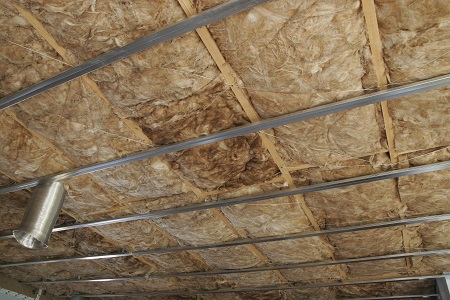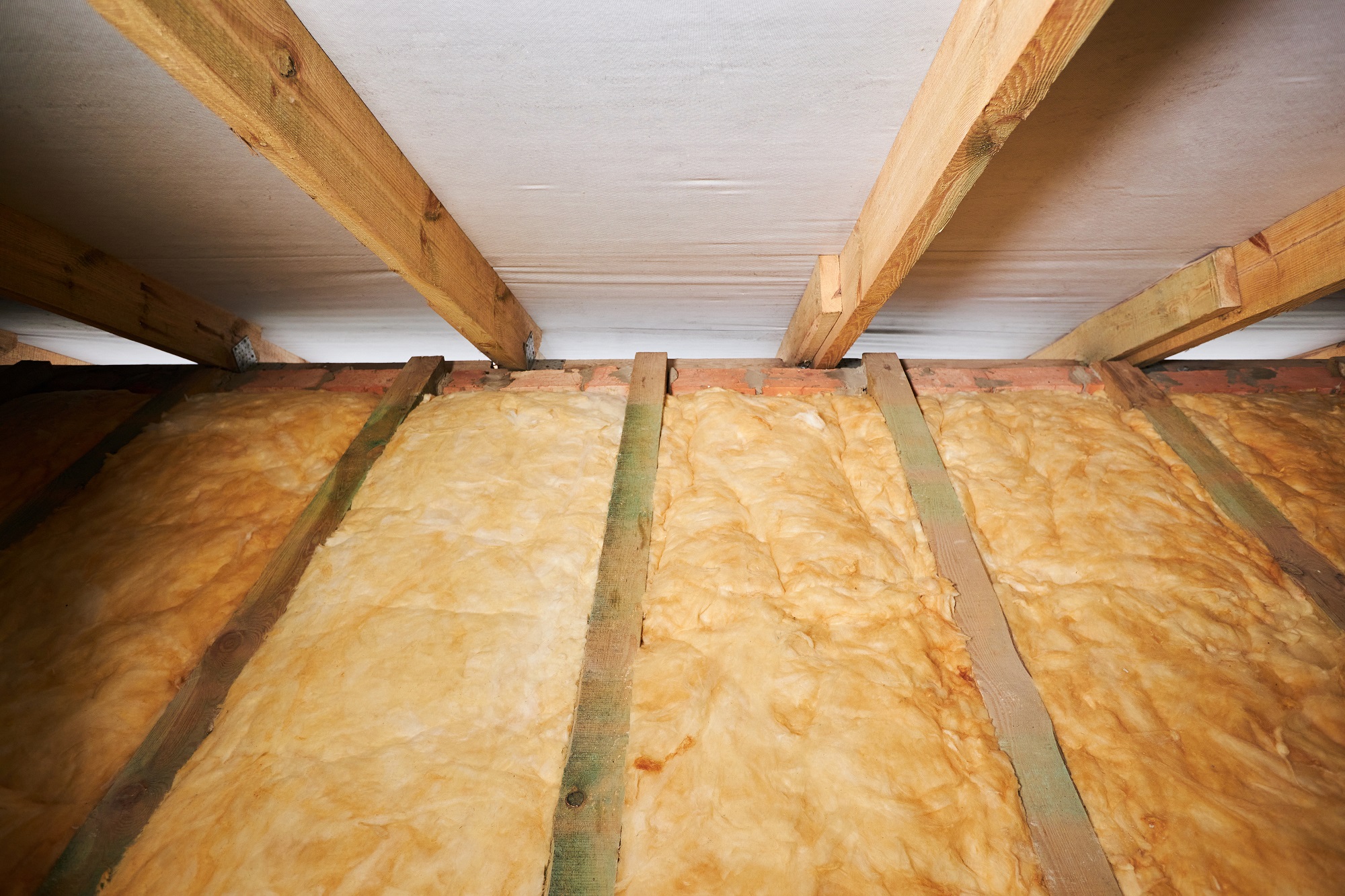Your roofing insulation is more than just stuffing pink fluffy material into your attic—it’s about understanding R-values, distinguishing between different types of insulation, and making smart choices that will affect your comfort and energy bills.
Whether you’re a seasoned homeowner or a new kid on the block, it’s important to get a grip on this topic. Why? Because making informed decisions about your roofing insulation could mean the difference between a cozy, energy-efficient home and a cold, drafty money pit.
So, are you ready to uncover the crucial facts about roofing insulation from your trusted roofing company at Precision Roofing & Gutters?
Understanding Roof Insulation

Understanding roof insulation is a key aspect of home improvement that can significantly improve your home’s energy efficiency and indoor comfort and potentially reduce your energy bills. It’s essential to understand the R-value of roofing insulation – a higher R-value gives better insulation against heat flow. This knowledge helps you choose the right type of roof insulation, providing the most effective barrier for your home’s needs.
There are several types of roof insulation to consider. Spray foam, batt insulation, loose-fill, structural insulated panels, and rigid boards all offer varying effectiveness, costs, and installation requirements. Each type has its pros and cons, so you’ll need to weigh these against your home’s specific needs.
Think about insulation for your roof when planning a replacement project. Often, it’s easier to manage similar home improvements simultaneously, and upgrading your roof’s insulation could help you make the most of your renovation. Insulate your home effectively, and you’ll see the benefits in improved energy efficiency, more comfortable indoor temperatures, and potentially lower energy bills. Remember, understanding roof insulation isn’t just about keeping warm; it’s about making your home more energy-efficient and cost-effective.
The Importance of R-Values
Building on the concept of roof insulation, let’s explore the critical role of R-Values in determining the effectiveness of your chosen insulation material. R-Values are integral to your roof and attic insulation, and understanding their importance could save you significant money in energy costs.
- R-Values measure the resistance of an insulation material to heat flow. The higher the R-value, the greater its insulating power and the better it’ll keep your home warm in winter and cool in summer.
- Different insulation types have varying R-values. For instance, spray foam typically has a higher R-value per inch than loose-fill or batt insulation. Your choice should take into account the unique needs of your home, climate, and budget.
- Energy Star provides a guide to the recommended R-Values for different regions. It’s crucial to follow these guidelines for maximum energy efficiency.
Types of Roofing Insulation
When it comes to roofing insulation, you’ll find a variety of types, each offering different levels of protection and recommended R-values based on local weather patterns and the specifics of your home’s construction. The most common types of roofing insulation are spray foam, batt insulation, loose-fill, structural insulated panels, and rigid insulation boards.
Spray foam is known for its excellent thermal resistance and ability to fill in gaps and cracks in your roof deck. Batting, often made from fiberglass or mineral wool, is easy to install between roof rafters, providing a high R-value. Loose-fill insulation, typically made from cellulose or fiberglass, is blown into the roof space, perfect for hard-to-reach areas.
Rigid insulation boards, made from foam or polystyrene, offer a high R-value and can be installed above the roof deck, an ideal solution for flat roofs. Structural insulated panels combine insulation and structural components in one unit, providing a high degree of energy efficiency.
When selecting the best roof insulation for your home, consider the type of roof, your local climate, and the recommended R-values. Each insulation material has its own benefits and drawbacks, but the right choice can significantly enhance your home’s energy efficiency.
Navigating Insulation Costs
As you navigate the cost of insulation, it’s important to know that prices can vary greatly depending on the type and material of the insulation.
- Spray foam insulation: This type is a pricier option. Despite the higher costs, spray foam insulation provides superior R-values, making it a cost-effective solution in the long run.
- Batts and rolls insulation: This is a more affordable option. The cost range is influenced by the type and thickness of the insulation.
- Foam board insulation: The R-values range from 3.6 to 5.8 per inch, providing excellent insulation at a reasonable cost.
Choosing the Right Insulation
In choosing the right insulation for your roof, it’s crucial to consider factors such as the recommended R-values for your climate zone, the specific parts of your house needing insulation, and the various degrees of protection and energy efficiency different insulations provide.
Your choice of roofing insulation isn’t a one-size-fits-all decision. It’s crucial you consider the types of insulation available – like spray foam, batt insulation, or rigid boards – and their respective R-values. This value indicates the thermal performance of the material, with higher numbers offering better insulation.
Your location also plays a significant role in choosing the right insulation. For instance, if you live in a colder climate, you’ll need insulation with a higher R-value to keep your home warm. Conversely, in a warmer climate, a lower R-value may suffice.
Ask Your Professional Roofers at Precision Roofing & Gutters If Your Roof Needs Its Insulation Upgraded
Now that you’ve considered the types of insulation and their respective R-values, it’s worth consulting with our roofing experts at Precision Roofing & Gutters to determine if your residential roof’s insulation needs an upgrade.
Here are three reasons why you might need your roofing insulation upgraded:
- Inadequate Insulation: If your home feels drafty, it may be due to insufficient insulation. The insulation may not be adequate to prevent heat transfer, leading to higher energy costs and uncomfortable living conditions.
- Old Insulation: Insulation materials deteriorate over time. If your insulation is old, it may not be as effective, necessitating an upgrade.
- Damage: Water leaks, moisture issues, pests, or other damage can compromise the effectiveness of insulation. If you’ve experienced any of these, you probably need an insulation upgrade.
Our expert roofers at Precision Roofing & Gutters can evaluate your current insulation and advise if an upgrade is necessary. Remember, a well-insulated roof isn’t only energy-efficient, but it also contributes to the durability and longevity of your entire home.
Roofing services Precision Roofing provides:
- Certified Residential Roofing Contractor
- Roof Inspections
- Roof Repair Services
- Roof Leak Repairs
- Roof Maintenance
- Roof Installation
- Roof Replacement
- Flashing Replacement
- Removal Services
- Asphalt Roofing Services
- And More
Don’t wait until you experience the adverse effects of poor roofing insulation. Upgrade now for peace of mind and long-term cost savings.
Contact us today for exceptional customer service on your next roofing project.
Visit our Testimonials page to see what our customers have to say about our roofing company. Our experienced roofers strive to build lasting relationships with their customers.

